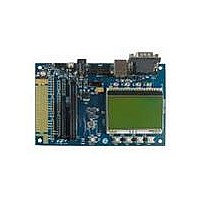SDBC-DK3 Silicon Laboratories Inc, SDBC-DK3 Datasheet - Page 12

SDBC-DK3
Manufacturer Part Number
SDBC-DK3
Description
KIT WIRELESS DEV EZRADIOPRO
Manufacturer
Silicon Laboratories Inc
Type
Transceiverr
Datasheet
1.SDBC-DK3.pdf
(76 pages)
Specifications of SDBC-DK3
Wireless Frequency
868 MHz
Interface Type
RS-232, USB
Modulation
GFSK
Operating Voltage
3.3 V
For Use With/related Products
EZRadioPRO®
Lead Free Status / RoHS Status
Lead free / RoHS Compliant
Lead Free Status / RoHS Status
Lead free / RoHS Compliant, Lead free / RoHS Compliant
SDBC-DK3 UG
7. Radio Evaluation
7.1. Demonstration Mode
When shipped, the MSC-DBSB8 comes with example firmware, which is used to demonstrate the basic RF
capabilities of Silicon Labs’ RFIC. In the current public release of this firmware only the EZRadioPRO Si4432
transceiver is supported, later releases are intended to demonstrate the ever increasing number of products from
Silicon Labs.
Newer firmware versions of the factory firmware may be available on the Silicon Labs website or via the WDS
CDROM.
Introducing the PER demonstration (Version 3.xr Firmware)
Reference firmware v3.xr is designed to show the Si443x in a packet error rate test demonstration. This firmware is
preloaded on to the c8051F930 microcontroller, but it is also available on the WDS CD-ROMs in the SDB section.
Source code to the Silicon Lab's firmware is also available in the same location, and is provided AS-IS for
reference purposes.
7.1.1. Packet Error Rates (PER)
Packet Errors are common place in wireless communications. In real life applications, these errors are handled
through the use of acknowledgements and retries. In the demonstration software such techniques are NOT
implemented such that system designers can understand range limitations in various environments, allowing them
to design robust protocols into their designs.
In order to use this demonstration, users should start the demo then move the two boards apart until packet errors
can be seen to start appearing and the average PER is in the order of 5%. At this point, the PER demonstration
should be cleared, and the test should be left alone to be re-run without being disturbed. It is expected that the
PER % will be reduce since the environmental factors will be more constant. Re-run the previous steps until a 2–
3% PER is found regularly at a given range. At this point, and with the current environmental conditions, you are at
a range where a higher level protocol is required. Silicon Labs has found that at a low datarate and sending
approximately 5000 packets, a 2–3 km range is attainable.
The demonstration shown below was performed along the Danube River in Budapest, Hungary using the Si4432.
12
Location: Danube River in Budapest, Hungary
Figure 8. Example Range-vs.-Data Rate
Rev. 0.4
Data rate
100 kbps
125 kbps
2.4 kbps
4.8 kbps
9.6 kbps
50 kbps
2.05 km
2.03 km
1.37 km
0.96 km
Range
1.5 km
1.1 km










